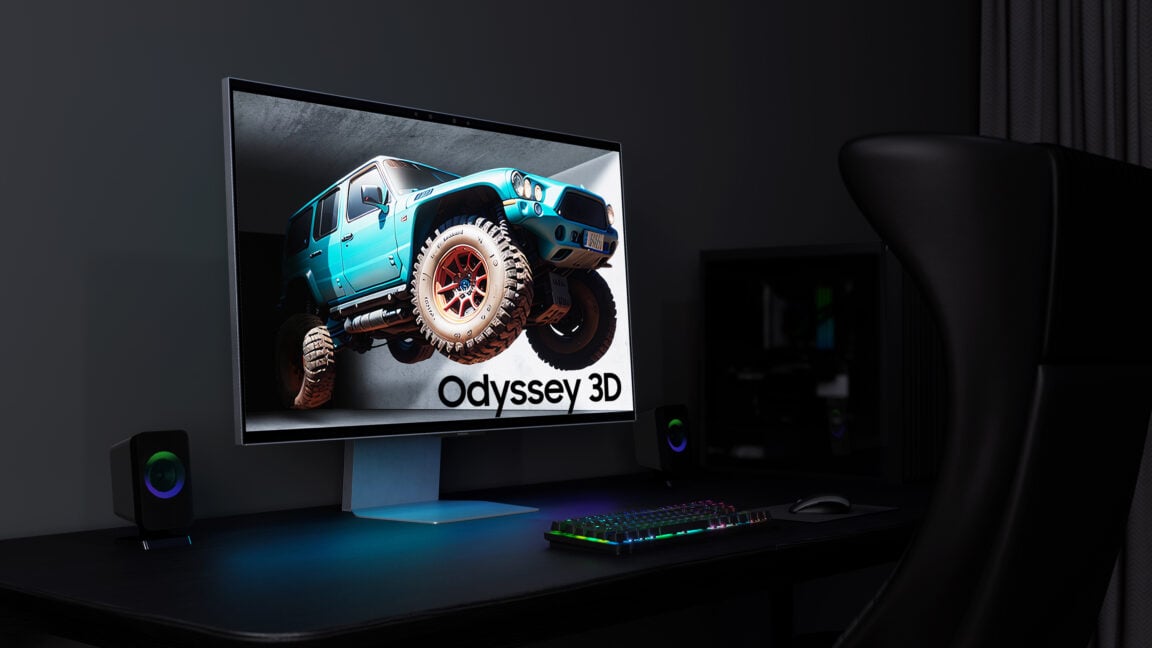- cross-posted to:
- [email protected]
- [email protected]
- hardware
- [email protected]
- cross-posted to:
- [email protected]
- [email protected]
- hardware
- [email protected]
means that you don’t have to wear glasses to access the monitor’s “customizable 3D experience.”
.
Lenticular lenses direct different images to each eye to make images look three-dimensional.So I guess it’s a 1 user solution, which is fine for a computer screen, but will probably not work for TV.
Yeah it doesn’t look like their TV division is doing this, just their PC gaming one.
I can live with that. I’m more concerned with software support. 3D games are plentiful, but last time this required a ton of specific support that ended up being fiddly and not very compatible.
I would think this is way more adaptable than 3D/VR glasses, like almost every 3D game will be able to utilize this with very few changes.
I mean… not really. You still need to send two half-res images to the screen. On principle the implementation is the same, the only thing that changes is how you’re representing that stereo image on the display itself.
No it’s not the same, VR games need to detect head movement, and this needs to be perfectly calibrated or people get nausea.
With the 3D screen you simply duplicate what you are already doing.Oh, I misunderstood. I thought you meant 3D glasses for previous-gen 3D monitors that used either polarized or shutter-based 3D glasses, not VR HMDs.
But it’s still a no, though. We know what it takes to get a 3D picture out of a 3D monitor, because that hasn’t changed since last-gen, so you still need driver/software support to properly format the image for 3D screens. In fact, legacy support is largely gone now, I don’t think it’s supported on current drivers anymore, so the entire thing has to happen all over again.
I can see how it’s easy to misunderstand, I’ll correct my post accordingly.
you still need driver/software support to properly format the image for 3D screens.
I’m pretty sure that’s been a standard feature in drivers for a long time.
It’s no different on the game software side to 3d glasses, assuming it doesn’t just do it as a post process on the display, which generally looks garbage and adds a ton of input lag.
It’s no different on the game software side to 3d glasses,
It absolutely is. With glasses if things aren’t calibrated perfectly you get nausea. The software must be able to support the sensors the glasses use to detect head movement.
With the screen being 3D you just add a 2nd eye view, which is only duplicating what the game is already doing, and you’re done.Edit:
I didn’t consider old fashioned 3D glasses, they aren’t really used anywhere AFAIK, so my response regards the difference to VR glasses, that track head movement, and updates perspective accordingly.But the real difference is that drivers have VR support now, and stereoscopic 3D is a subset of that. So the technology should have a better chance of gaining traction, if it works and the price is right.
Nobody calls a VR headset 3D glasses 😅
VR glasses are not a thing yet.
You’re confusing the head/eye tracking part with the 3d part.
But yeah they say they have eye/head tracking too.
That is only to direct the 2 images the lenses create correctly to each eye to create the 3D experience. Not to create a semi VR experience.
old fashioned 3D glasses, they aren’t really used anywhere AFAIK
TIL nvidia 3d vision is not a thing anymore 😅
https://en.m.wikipedia.org/wiki/Nvidia_3D_Vision#Discontinuation_of_support
I would really like that to be the case for playing 3D flatscreen games in VR.
It’s cool where supported (and one of the few ways to properly emulate a 3DS without original hardware).
But mixed reality monitors in VR still look way worse than a good 3D monitor (and a good 2D monitor, obviously, but you get what I mean).
I do wonder if all the work that’s been done to hack VR support into games will translate into an easier community-driven support path for something like this if it ever makes it to market.
By getting fancy with the lenses, it’s possible to accomodate more than one viewer:
https://www.cs.unc.edu/~andrei/pubs/2010_ISMAR_Autostereo.pdf
That seems very prototype like. Not nearly the clarity that was demoed last year:
https://www.digitaltrends.com/computing/samsung-3d-2d-gaming-monitor-ces-2024/
Yeah, I had to go back to a 15-year-old journal article to find something with the multi-viewer light path diagrams I was looking for.
I wouldn’t be surprised if the multi-user version was shelved. Of course it may come back, if the technology matures.
sounds like they are doing what the 3ds did with some upgrades. hopefully the “AI” is actually useful instead of just being injected into a product that doesn’t need it.
AI in this case is a meaningless term. You can likely just assume it means “hyper specialized algorithm”. AI is just the buzzword of the year… or last year.
Well, not fully, to accomplish the glassless 3d, most likely they need to be able to track eyes location. Eye tracking with AI models (or any object tracking from image/video) has taken huge leaps in past few years.
AI is very much buzzword nowadays, but AI models are also more than LLM’s.
I like 3D. I wish 3D would catch on, and technologies would advance. I’d LOVE to watch sports, on a 90 inch projection screen, in native 3D.
But 3D seems to be the “fetch” of the tech world. It’s just not going to be a thing.
It’s just not going to be a thing.
It will be, if they can figure out how to deliver a good glasses-free affordable experience for a shared screen.
Thus far, it’s only been single user screens that have been able to do glasses free at an inexpensive cost like the 3DS and even this article is about a monitor.
For big shared screens like TVs it’s always glasses or glasses-free, but prohibitively expensive. And that’s what kills 3D every time, the fucking glasses.
Probably faster to just wait for holodeck-like tech
Holography, the real kind, not the Star Wars kind, is probably the way forward. The display would be about as flat as current ones, but the image would appear three dimensional from any angle and wouldn’t require glasses. You could even lean side to side to change your perspective. I remember reading ages ago that a lab was working on it, but I think they had a frame rate of one every few minutes and it was monochrome and I haven’t heard anything since.
I’m with you there. It was very frustrating when Nintendo made the most successful iteration of this so far to hear a bunch of people crap on it only to turn around and go nuts over VR tech that had all the same drawbacks AND made you puke.
I pull out a 3DS every now and then still and man, after not using one for a while it still feels like a magic trick.
With VR an important aspect you’re not mentioning is the 3D movement you are now able to do, inhabiting the played character in a more true to form way
Oh, no, it’s clearly a different application of stereoscopy, don’t get me wrong, but it’s still stereoscopy. It does things that flat 3D screens don’t do, but it still has a lot of the same downsides and some extra ones on top. It’s insane to me that people who were extremely hostile to 3D monitors as being gimmicky transitioned smoothly to being wowed by mixed reality monitors, which really, REALLY aren’t nearly as good as having a physical screen you can look at with your eyeballs. The brief period of time when the Apple Vision Pro was a thing felt surreal.
Hell, of the two, I’d say the implementation of the 3DS matured better, and by the time of the 3DS XL pretty much every hardware issue had been solved. Arguably even modern high-end HMDs don’t solve all the problems and limitations imposed by hardware nearly as well as the 3DS did in just two iterations. Sure, different applications, and HMDs are trying to solve way harder issues that are often caused by both physics and the design of human eyeballs… but that’s kinda my point. I was actively bummed out that the Switch dropped that display tech.
I would be a lot more lenient if it was just a lack of enthusiasm, but man, a lot of people were actively, rabidly hostile towards any form of stereo 3D. I’m talking AI-style gleeful anger here. I know we’ve memory holed it a bit, but it was… a lot.
Internet connected front facing stereo cameras running on closed source software and little to no oversight? No thank you. The enshitification of tech demands more user data and I don’t need more Spyware in my home.
Make a high quality display panel with no OS except to run basic settings and I’ll pay a premium.
Could be really nice to have for seated VR games such as racing games if they can get the game to detect the display as a VR headset using steam vr or something.
3D is great for some particular experiences. It’s cool to watch some of the imax movies at home. A handful of the theatrical 3D releases were incredible.
Really though, they need to put more push into the “multi-view” tech that lets people watch a different input depending on their angle. That would also be a feature where it’s reasonable to implement AI, to track a particular viewer’s angle, and adjust the screen to match.
Then enable multiple Bluetooth headphone pairings, and you can have multiple people watching their own thing on the same tv. It would be super useful, but they never really pushed forward with the tech.
I truly miss 3D, I even get mad when 3DS games don’t have 3D features lol, it is almost as annoying as when the DS games have minimal or non existent touchscreen gameplay.
The 10th dentist.









